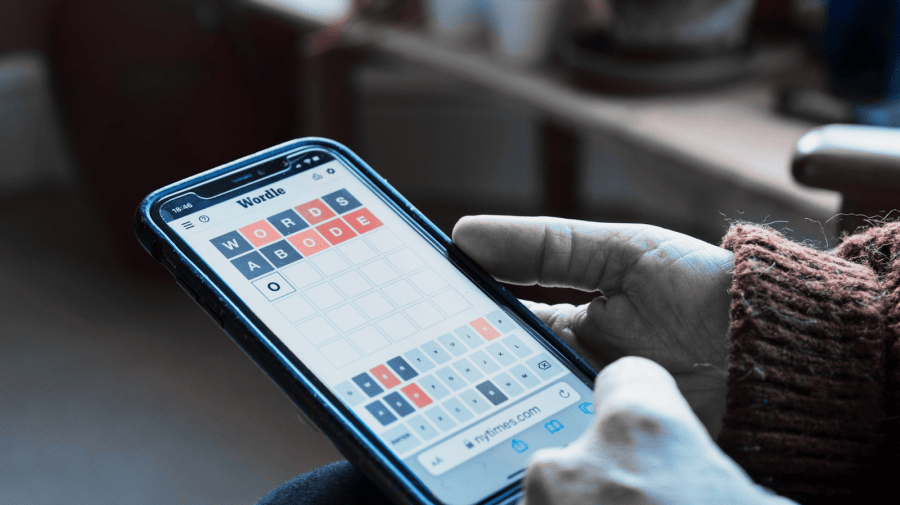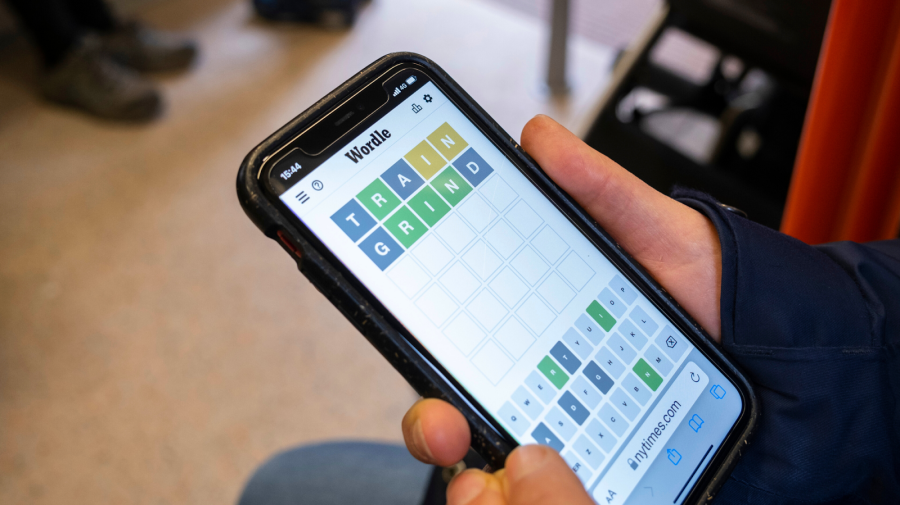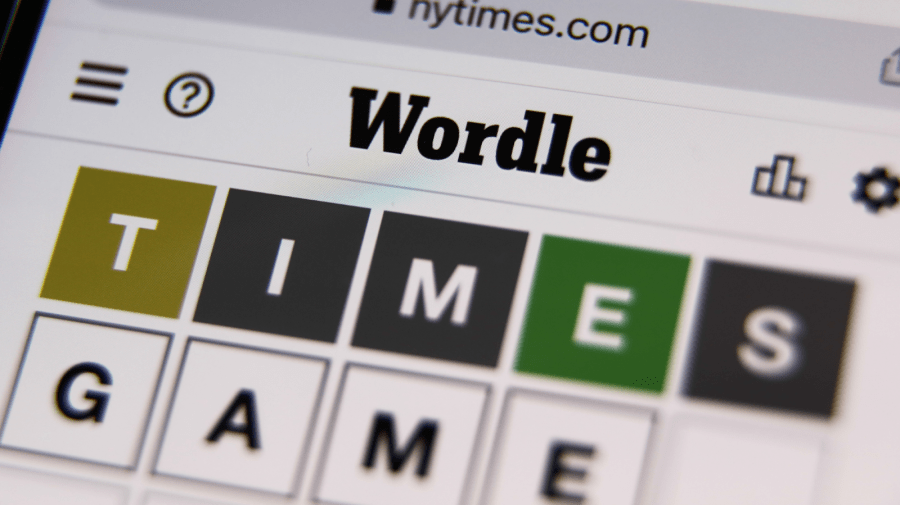
Everyone from musician and Oscar-winning filmmaker Questlove and late-night host Jimmy Fallon to actors Jennifer Beals (Book of Boba Fett, The L Word) and J. Smith-Cameron (Succession) to your co-worker are playing — and talking about — Wordle. Developed by Brooklyn-based software engineer Josh Wardle, Wordle is a web-based word puzzle that’s played by millions of users worldwide every day. Although it was just released in October 2021, Wordle quickly sparked enough interest to attract big-name buyers.
In a play to increase digital subscriptions, The New York Times Company added Wordle to its roster of games, which include its famous crossword puzzle and other titles like Spelling Bee. Impressively, Wardle received a price “in the low seven figures” for Wordle, and while the Times claims it will keep the game free — and not shove it behind a paywall — users remain skeptical, even months into the acquisition.
While Wordle’s status as a free-to-play game is cause for conversation, we’re also wondering if the Times made a smart move. Not every word-centric puzzle game can be a long-term hit, like Spelling Bee, or ubiquitous and enduring, like the crossword puzzle. So, will Wordle be remembered as a trend that, soon enough, fizzles out — or will the Times’ seven-figure deal help cement it as a crossword-level classic?
So, What Is Wordle?
Been living under a rock for the last few months, you might’ve missed all of the buzz surrounding Wordle. If that’s the case, we’ll give you a quick rundown of the uber-popular word puzzle. Put simply, the Wordle player’s objective is to guess the five-letter word of the day in six tries or less. But the guessing process isn’t as random as it sounds. (More on that in a minute.)
As mentioned above, the hit game was developed by a software engineer, Josh Wardle, but it was never a play to nab a seven-figure payout. In fact, Wardle — yes, the game’s name is a pun on his surname — created the game for his partner. Eventually, the couple shared their fun, private pastime with family and friends. A hit with Wardle’s pals, the guess-the-word-of-the-day game soon went public in October 2021 — and, thanks to the incredible power of word-of-mouth, it soon went viral.
How Do You Play Wordle?
With six tries to guess a five-letter word, of all the words in the English language, you might be thinking Wordle would be quite the challenge, right? Luckily, the game doesn’t encourage you to guess letters at random after your first attempt.
While you do have to try and guess the whole word on each turn, there’s some strategy. (And, yes, your guesses have to be actual words, so that whole RSTLNE tactic from Wheel of Fortune isn’t going to work in a game of Wordle.) The good news is that you have an unlimited amount of time to make each guess, and you can play around with the order of the letters and your selections before submitting each guess.

The hardest part is taking the plunge and guessing an initial word. After that, Wordle gives you hints of sorts. Once you submit your first five-letter word, the letters that are placed correctly will turn green. If one of your letters is in the word but not placed correctly, it’ll turn yellow. And, finally, letters you’ve guessed that aren’t in the word at all will turn a darker gray.
Wordle will still allow you to make guesses that include letters that have already turned gray, which indicates they’re not part of the word of the day, but, in some respects, you’d be “wasting” a guess by repeating incorrect letters. If you guess the Wordle of the day within six guesses, you’ll win, but, if you fail to do so, that’s it — until the following day, when the puzzle refreshes.
An added bonus? If you play Wordle each day from the same browser (and you don’t clear your cookies), it’ll track your results and provide you with statistics, like how many times you’ve gotten the word on the first, second, third tries, and so on.
Wordle Tips & Tricks
Most of the tips and tricks for being a Wordle champ are based on that all-important first guess. The theory? If you guess enough correct letters — green or yellow — with that first submission, you’ll have a better chance, and an easier time, of getting those more obscure letters in subsequent guesses.
First, focus on vowels, which often come in certain common pairings. Often, choosing a first word that contains as main vowels as possible is a good way to narrow things down. For your first submission, try guesses like “ocean”, “radio”, “video”, or “audio” — all of which are vowel-heavy five-letter words. But, of course, vowels aren’t the only area of focus. For example, “H”, “W” and “Y” are some of the most commonly used consonants in the English language. Letters like “R”, “L”, “S” and “T” can also go a long way.
Some people have come up with more… involved ways of thinking about Wordle. The math angle, for example, can be helpful. If the correct answer is a combination of five of the 26 letters in the English alphabet, there’s a finite — although, yes, very large — number of possibilities. One coder built this theory into an algorithm and developed a list of the best initial Wordle guesses.
But Why Is Wordle So Popular?
After becoming available to the general public online in October 2021, Wordle had about 90 daily users by November 1. By the middle of the month, that daily user number had grown to 300,000. Now, millions of people worldwide play the game. So, what was the recipe for Wordle’s incredible success?
In a world where you can marathon watch anything, Wordle exploits this feeling we all crave — this feeling of novelty. Unlike other popular free-to-play apps, like Candy Crush or Among Us, you can’t just spend hours upon hours playing Wordle. Instead, it’s a once-a-day thing — and that makes the victory that much sweeter.

Beyond that rush of novelty, Wordle also supplies a sense of community. It’s kind of like watching a TV show in the years before streaming; the show would air on a particular night, at a particular time, so you knew you were watching it alongside everyone else in your life. The next day, at work or school, that shared experience allowed for “watercooler talk” — a new topic to discuss, a fresh commonality. With Wordle, it’s similar; millions of users around the globe are given the same puzzle on the same day.
Yes, that makes Wordle spoilers brutal, but it also means celebrating with friends and chatting about Wordle strategy with peers in the breakroom. If you’re the first person in your friend group to solve the puzzle, the bragging rights are worth the commitment to the game.
Not to mention, much of Wordle’s meteoric rise in popularity stemmed from Twitter; according to Siobhan Murphy, Twitter’s communications lead, “the conversation on Twitter about Wordle has experienced a daily average growth rate of 26 percent”, thanks to users sharing their Wordle scores (via The New York Times).
Now Trending: Will The New York Times Help Wordle Become a Classic Puzzle Game?
Before Wordle took off, there was Zynga’s Words With Friends, a Scrabble-like smartphone game. With 13 million active users over half a decade after its debut, Words With Friends defied the viral game odds. Sure, it may not be as all-the-rage as it was in 2010, but it stuck around in an unexpected way. Will Shortz, the Times’ infamous crossword puzzle editor, notes that, “There’s virtually no way to predict fads like [Wordle]. They take off for no apparent reason and then die as people move on to other things.”
Shortz also noted that it’s the “perfect” game for the age of short attention spans. There’s no doubt that the new-puzzle-each-day novelty — this rationing out of excitement — and Wordle’s sense of community give it a real shot at enduring. Other gaming fads, from Farmville to Words With Friends, die down without sufficient updates or add-ons, but Wordle’s simple mechanics and wide appeal might help it endure.
In addition to landing a seven-figure deal for its creator from The word games authority, Wordle has seeped into the cultural conversation, and lexicon, in a way many trends don’t. Many folks, including Mitch Graham, the senior VP of alternative programming at CBS, have noted that Wordle is reminiscent of the old game show Lingo.
While Lingo has been revived (or failed to be revived) several times, it seems as though Wordle’s global success is pushing the network to revamp Lingo again — this time with RuPaul (RuPaul’s Drag Race) at the helm as host. “The word game craze is sweeping the nation,” Graham announced, “and Lingo will deliver a fast-paced, fun and addictive show for the whole family.”If the cross-media appeal is any indication, Wordle may just have staying power. We’re excited to see how it’ll pan out, but, for now, we’re just hoping that The New York Times keeps Wordle a free-to-play, accessible experience.






